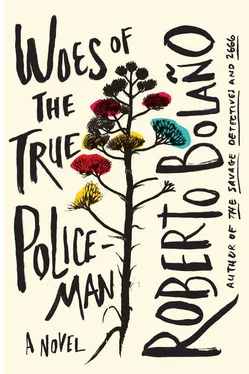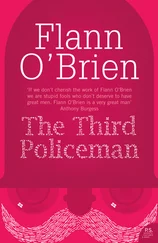“All right,” said Amalfitano, grateful though he couldn’t say why.
They circled around the center of Santa Teresa in Castillo’s car, a yellow 198 °Chevy. Their first stop was at the Dallas, where they chatted politely about painting, forgeries, and literature, and then they left because Castillo decided there were too many students. Without speaking, they drove along streets unfamiliar to Amalfitano until they reached the Just Once, and then, strolling down brightly lit and shuttered streets where it was hard to park a car, they stopped at the Dominium of Tamaulipas and the North Star and later the Toltecatl. Castillo kept laughing and drinking more mescal.
The Toltecatl was a big, rectangular room, the walls painted sky blue. On the back wall, a six-foot-square mural featured Toltecatl, god of pulque and brother of the maguey goddess Mayahuel. Indian drifters, cowboys and herds of cattle, policemen and police cars, ominously abandoned customs stations, amusement parks on either side of the border, children on their way out of a school blazoned with the name — painted in blue on a whitewashed wall — Benito Juárez, distinguished son of the Americas, a fruit market and a pottery market, North American tourists, shoeshine men, singers of rancheras and boleros (the ranchera singers looked like gunmen, the bolero singers suicidal or like pimps, Castillo remarked), women on their way to church, and hookers talking, running, or gesturing mysteriously: this was the backdrop, while in the foreground the god Toltecatl, an Indian with a chubby face covered with welts and scars, laughed uproariously. The owner of the bar, Castillo told him, was a man by the name of Aparicio Montes de Oca, and in 1985, the year he bought the place, he had killed a man at the busiest time of day, in front of everyone. At the trial he got off by pleading self-defense.
When Castillo pointed out Aparicio Montes de Oca behind the bar, Amalfitano noticed how much the bar owner looked like the figure of Toltecatl painted on the wall.
“It’s a portrait of him,” said Amalfitano.
“Yes,” said Castillo, “he commissioned it when he got out of jail.”
Then Castillo took Amalfitano home with him to prove that he wasn’t lying, he really was a forger.
He lived on the second floor of a dilapidated three-story building on the edge of town. On the first floor hung the sign for a tool wholesaler; no one lived on the third floor. Close your eyes, said Castillo when he opened the door. Amalfitano smiled but didn’t close his eyes. Go on, close your eyes, insisted Castillo. Amalfitano obeyed and ventured cautiously into the sanctum to which he was being granted access.
“Don’t open them until I turn on the light.”
Amalfitano opened his eyes immediately. In the moonlight coming in through the uncurtained windows, he got a glimpse of the contours of a large room plunged in a gray fog. At the back he could make out a big Larry Rivers painting. What am I doing here? wondered Amalfitano. When he heard the click of the switch he automatically closed his eyes.
“Now you can look,” said Castillo.
The studio was much bigger than he had thought at first, lit by many fluorescent bars. In a corner was Castillo’s spartan-looking bed; in another corner, a kitchen reduced to the bare essentials: hot plate, sink, a few pots, glasses, plates, cutlery. The rest of the furnishings, apart from the canvases stacked everywhere, consisted of two old armchairs, a rocking chair, two sturdy wooden tables, and a bookcase filled mostly with art books. Near the window and on one of the tables were the forgeries. Do you like them? Amalfitano nodded.
“Do you know who the artist is?”
“No,” said Amalfitano.
“He’s American,” said Castillo.
“I can tell that much. But I don’t know who he is. I’d rather not know.”
Castillo shrugged.
“Do you want something to drink? I think I have everything.”
“Whiskey,” said Amalfitano, suddenly feeling very sad.
I’ve come here to make love, he thought, I’ve come here to take my pants off and fuck this naïve kid, this art student, this forger of Larry Rivers, early-or mid-career Larry Rivers, what do I know, a forger who brags when he should cringe, I’ve come to do what Padilla predicted I would do and what he surely hasn’t stopped doing for even a moment, even a second.
“He’s Larry Rivers,” said Castillo, “an artist from New York.”
Amalfitano took a desperate gulp of whiskey.
“I know,” he said. “I know Larry Rivers. I know Frank O’Hara, so I know Larry Rivers.”
“Why did you say you didn’t, then? Are they that bad?” asked Castillo, not offended in the least.
“I can’t imagine who buys them, frankly,” said Amalfitano, feeling worse and worse.
“Oh, they sell, believe me.” Castillo’s voice was smooth and persuasive. “There’s a Texan who buys them — short little guy, a real character, you have to meet him — and then he sells them to other filthy rich Texans.”
“It doesn’t matter,” said Amalfitano. “Forgive me. We’re here to go to bed, aren’t we? Or maybe not. Again, forgive me.”
Castillo sighed.
“Yes, if you want. If you don’t, I’ll take you home and we’ll pretend nothing happened. I think you’ve had too much to drink.”
“So do you want to?”
“I want to be with you, in bed or talking, it makes no difference. Or not much, anyway.”
“Forgive me,” murmured Amalfitano and he dropped onto a sofa. “I don’t feel well, I think I’m drunk.”
“No worries,” said Castillo, sitting down beside him, on the floor, on an old Indian rug. “I’ll make you coffee.”
After a while the two of them lit cigarettes. Amalfitano told Castillo that he had a seventeen-year-old daughter. They talked, too, about painting and poetry, about Larry Rivers and Frank O’Hara. Then Castillo drove him home.
The next day, when he got out of his last class, Castillo was waiting for him in the hall. That same afternoon they slept together for the first time.
One morning a gardener stopped by Amalfitano’s classroom and handed him a note from Horacio Guerra. Guerra wanted to see him in his office at two. Without fail. Guerra’s office turned out to be hard to find. Guerra’s secretary and another woman drew him a map. It was on the first floor of the department building, at the back, next to the little theater — hardly bigger than a classroom — where college actors put on plays once a month for students, family, teachers, and other Santa Teresa intellectuals. Horacio Guerra was the director, and next to the dressing room, in what must once have been the props room, he had set up his office. It was a space with no natural light, the walls papered with posters for old shows, a shelf of university press books, a big oak table stacked with papers, and three chairs in a semicircle, facing a black leather swivel chair.
When Amalfitano came in, the room was dark. He spied Guerra sunk low in the big chair and for an instant he thought the other man was asleep. When he turned on the light he saw that Guerra was wide awake: his eyes were unnaturally alert and bright, as if he were high, and there was a sly smile on his lips. Despite the manner of their meeting, they greeted each other formally. They talked about the school year, about Amalfitano’s predecessors, and about the university’s need for good professors. In the sciences the best people left for Monterrey or Mexico City, or made the leap to some American university. In the arts it’s a different story, said Guerra, nobody pulls a fast one on me, but to make sure of it I have to be everywhere, supervise everything personally, it’s a lot to handle. I can imagine, said Amalfitano, who had decided to tread with care. Then they talked about theater. Horacio Guerra wanted to revamp the department’s drama program and in order to do so he needed the cooperation of everyone. Absolutely everyone. The department had two theater groups, but if he was to speak frankly both were undisciplined. Though the students weren’t bad actors. Amalfitano wanted to know what he meant by undisciplined. Announcing the date of an opening and not opening, losing an actor and having no understudy, starting the show half an hour late, failing to stick to a budget. My task, explained Guerra, is to find the evil and root it out. And I’ve found it, my friend, and I’ve rooted it out. Do you want to know what it was? Yes, of course, said Amalfitano. The directors! That’s right, those ignorant kids, ignorant but most of all undisciplined, who have no idea that a play is like a battlefield, complete with logistics, artillery, infantry, cavalry to cover the flanks (or light armored units, don’t take me for some old fart, even air squadrons if you insist), tanks, engineers, scouts, etc., etc.
Читать дальше








![О Генри - Бляха полицейского О’Руна [The Badge of Policeman O'Roon]](/books/405347/o-genri-blyaha-policejskogo-o-runa-the-badge-of-po-thumb.webp)



